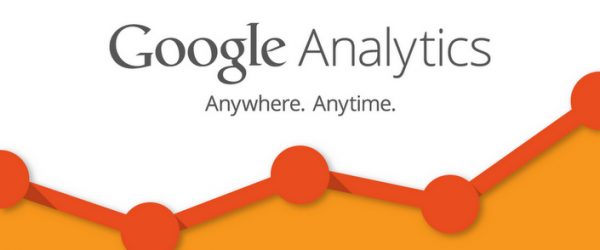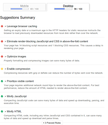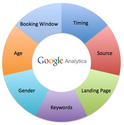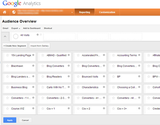-
About
- About Listly
- Community & Support
- Howto
- Chrome Extension
- Bookmarklet
- WordPress Plugin
- Listly Premium
- Privacy
- Terms
- DMCA Copyright
- © 2010-2025 Boomy Labs


 osanda cooray
osanda cooray
Listly by osanda cooray
I've gathered a list of most popular Google Analaytics related content on social networks based of total shares in the past 6 months.

The day many SEO professionals hoped would never come, but feared eventually would, apparently has arrived today. It appears that Google has cut off keyword data altogether. Nearly two years after making one of the biggest changes to secure search that resulted in a steady rise in "(not provided)" data, Google has switched all searches over to encrypted searches using HTTPS.

Do you use Google Analytics to help you make marketing decisions? Are you familiar with the latest changes in Google Analytics? Google recently made the switch to secure search, which has resulted in a larger return of "not provided" keyword data in Analytics reports.

Two things I love a lot: 1. Frameworks, because if I can teach someone a new mental model, a different way of thinking, they can be incredibly successful. 2. Visuals, because if I can paint a simple picture about something complex it means I understand it and in turn I can explain it to others.

Have you seen complete marketing funnels, but not been sure where to start building yours? In this post, John Doherty walks us through how to build a rudimentary full marketing funnel, from first touch to conversion, all with Google Analytics data.

Google Analytics is one of the best free data analysis tools on the web. But having this powerful tool at your disposal is irrelevant if you don't know how to harness its potential. People say you can't teach an old dog new tricks, but whether you're a beginner at analytics or an expert, there is untapped wisdom in the posts below.

Whether you're setting Google Analytics up on a site for the first time or checking a client's existing implementation, there are quite a few standards to remember. This post offers a simple checklist for doing the job right.

This I Believe was one of my favorite NPR programs. It's raison d'être: "Americans from all walks of life share the personal philosophies and core values that guide their daily lives." In honor of that spirit, I'll take a step away from our mutual obsession with marketing and analytics and share with you the philosophies and values that guide me when I go to work every day.

Admission time: I don't know much about Google Analytics. In fact, I generally gloss over when I read anything about it, since I usually find it all quite overwhelming and hard to understand. And not that much fun, to be honest. But, being a content marketer, I can't afford to ignore Google Analytics.

We and our clients have relied on keyword reports for so long that we're now using (not provided) as a crutch. This post offers 10 ways you can use Google Analytics to prove your SEO value now that those keywords are gone.

Labels: Announcements, Features Users prefer fast sites. And businesses benefit from it: faster sites tend to have lower bounce rates, increased customer satisfaction and better engagement. Site owners agree, and it shows in their actions taken to optimize site speed: we're pleased to see from our own benchmarks over the last two years the web is getting faster (not only desktop, even mobile access is around 30% faster compared to last year).

Google today launched a new hub called Analytics Academy, a new hub for digital marketers and analysts to stay up-to-date. The site features free community

https://analyticsacademy.withgoogle.com/platform-principles Join us for our next course on Analytics Academy: Google Analytics Platform Principles. In this self-paced online course we'll dive deeper into how the platform collects, transforms, and organizes data in Analytics. Understanding how this works can help you refine your implementation and uncover more valuable insights about your business.

For any business owner, regardless of size, understanding your customer is key to longevity and marketing success. It's the basic tenet of Marketing 101: If you understand and meet the needs of your customer, you will understand and meet the needs of your business.

We all know that analytics are good for understanding how a visitor behaved on your website - what pages they looked at, what buttons they clicked or what keywords they used to find you. You can also use analytics to track campaigns like email blasts and paid advertising. That's pretty basic stuff.

Now that we've entered the age of Hummingbird, there's no room for marketing hunches and gut feelings. Successful digital marketing campaigns are now data-driven. The biggest problem isn't acquiring data. In fact, many people are suffering from paralysis of analysis and going nowhere. The tricky part is extracting the most useful data in a meaningful way.

If the idea that SEO is dead crosses your mind or turns up in print, dismiss it. The fact is that nothing is really going to change in the way that we pursue the almighty ranking, with the possible exception of the resurgence of the long tail keyword, which was working its way back into our hearts anyway.

In a lot of ways, Google Analytics is like the eyes and ears of your website. The popular free tool automatically collects helpful data for you, so you can better understand, serve and build your online audience -- and your customers. Having a website but not knowing how people use it is like talking without listening.

Google Analytics is a huge part of our business at Margaret Elizabeth and one of the first pages I open when I start my day. We use analytics to track all elements of our site. How many visitors came to my site last week? How much revenue did we generate in September?

We've all become accustomed to seeing (not provided) instead of organic keywords, but many marketers are still wondering what to do without that data. Here are five tactics that'll get you back on track.

This week we bring you Rachel Starr, Devon Breeze, Lucy Everleigh, and more.

Web analytics expert and Google's Digital Marketing Evangelist Avinash Kaushik once said, " All data in aggregate is crap," because insights aren't found when looking at large amounts of data, but rather through focusing on important segments.

Information about customers has never been available on the scale it is today. Businesses are learning new ways to leverage data to improve themselves on a daily basis. They're realizing that data collection and data analysis have a measurable return on investment, and decision-makers are asking to see them.

Unless you've been hiding under a rock without Wi-Fi, you've probably heard about Google's plans to encrypt all of organic search. This will turn what started out as a "single digit percentage of (not provided) organic keywords" in your Google Analytics website data into "100%."

Analytics. It could be the deepest, darkest mystery in your organization, served up by a few select tech wizards, or it might be the solitary master by which all company decisions begin and end. In all likelihood, it's somewhere in between. No matter where you fit on the spectrum of analytics know-how, data-driven decision-making is here to stay.
